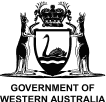Westport has partnered with the Western Australian Marine Science Institution (WAMSI) to deliver the $13.5 million WAMSI-Westport Marine Science Program. This 3-year program is developing the latest data, information and modelling on the complex environmental systems and community values associated with Cockburn Sound.
Project 2.2: Drivers of seagrass decline in Perth waters and actions to halt decline
Research theme: Benthic habitats and community
Researchers: K McMahon, S Styrdom, N Dunham, J Whale, C Webster and N Said
Publication date: April 2025
Understanding drivers of seagrass decline around Perth water
Using historical monitoring data and the collective expertise of marine and seagrass experts in WA, this study looked to understand the drivers of seagrass decline in Perth waters, and what can be done to halt or even reverse it.
The project reviewed 27 different seagrass sites along the Perth coastline, including Cockburn Sound and Owen Anchorage, and potential drivers of impacts or change.
The review considered the condition of the different seagrass sites, including those degraded and those that remain healthy or even improved, and analysed these against 17 potential drivers of decline.
The aim was to identify the top impacts, which could then inform mitigation and restoration efforts.
What the study found
- The 7 most common drivers that negatively impact seagrass condition were: storms, pollutants and toxicants, increased temperature, erosion and/or sediment deposition, altered hydrodynamics, physical disturbance from anchoring, and low light.
- Actions or activities related to these drivers included dredging, shipping and boating, fishing, coastal infrastructure, pollution, biological interaction including grazing and climate change.
- Of the 27 sites monitored, 6 sites had experienced a significant decline over time, including Warnbro Sound, Southern Flats, Jervoise Bay, Garden Island and Woodman Point.
- 75 different actions linked to the specific drivers were identified that could improve seagrass condition and/or build resilience in seagrass ecosystems within Perth coastal waters
What the report recommended
The report recommended undertaking an extensive risk benefit analysis before implementing any the 75 identified actions to improve the resilience and health of seagrass meadows.
How Westport will use this report
Westport will use this report to inform its environmental management strategies for the port development, with the intent of supporting the long-term health of seagrass and Cockburn Sound.
You can read the full report here.





